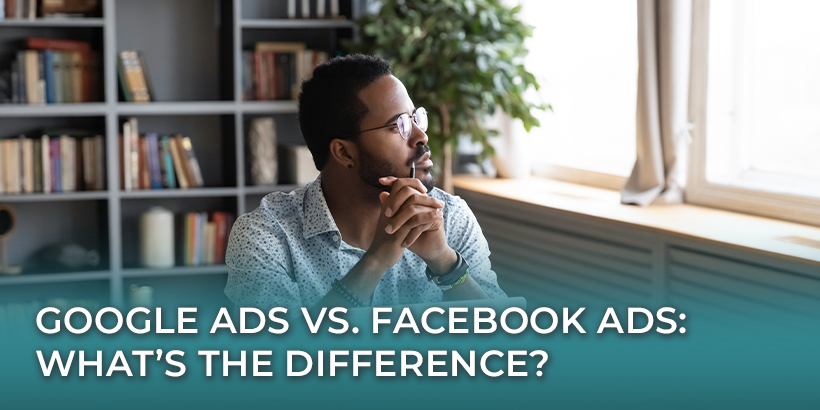
As you think about how to divvy up your organization’s ad budget, it’s important to understand the strengths and weaknesses of your options.
In the world of digital advertising, the two most popular platforms are Google Ads and Facebook Ads. If you and your organization haven’t used them in the past, you may be wondering: what’s the difference? Which one should you use?
Since we help brands run Facebook advertising campaigns, we thought we’d explore the differences between these platforms and help you decide what each is best suited for.
Here’s a brief overview of some of the biggest differences between Google Ads and Facebook Ads.
Search vs. social
In the past, the main difference between these two platforms was how you targeted your audience. Google’s Search Network let you target people based on what they’re looking for. Facebook let you target people based on their interests and behavior.
This difference has often been described as paid search vs. paid social. But today, Google offers similar targeting options, so the main difference is where your ads appear.
Advertising where people spend their time
Google Display Network lets you place ads on 98 percent of all websites. This allows you to create banner ads and video ads, and you can spend your budget on a wider variety of goals, such as brand awareness, rather than simply trying to drive conversions. And of course, when people search for things in Google, your ads can appear at the top of the results.
Facebook’s big advantage is that you get to advertise on some of the most-used apps in the world. But both choices can put your brand in front of the right people.
Both allow you to retarget website visitors
Facebook and Google both let you install a “retargeting pixel” on your website. This lets you serve ads to people who have visited specific pages on your site, such as your pricing page, a product page, or a guide to a topic. These ads can sometimes be more effective because your audience is already at least a little familiar with your brand.
This can be a great option if your website gets a lot of traffic (which means you have a larger pool to advertise to).
Both can create “lookalike audiences”
Facebook and Google give you a lot of different ways to target people. One of the more unique methods is to create a “lookalike audience” in Facebook, or “similar audiences” in Google. If you already have an email list, you can upload these leads to either of these platforms. They’ll find any accounts associated with those email addresses and then target people with similar interests and behavior. So you can basically tell Facebook or Google, “Find me more people like this.” You can also create lookalike audiences based on your website visitors and other audience groups.
This is especially helpful if you’ve created buyer personas and segmented your lists, so you have a better sense of what messaging will be most effective.
Google ads can target people later in the buying cycle
Facebook is great for identifying the types of people you want to talk to. But since Google shows people your ads in search results based on what they’re searching for, you can choose keywords that people look for when they’re about to buy. Someone searching for your product category, for example, is a lot more likely to buy than someone searching for a popular topic.
Facebook ads are more visual than search ads
Google ads can come in a variety of formats. But in paid search ads, you’re working with text. (People don’t like to see video ads taking up their search results pages.) Facebook, on the other hand, is a social media platform where images and videos are a natural part of the newsfeed. So Facebook ads give you a lot more opportunity to get creative and visually showcase your brand through ad formats like carousels, collections, and slide shows. If you have a solid creative team with capacity to design ads that make your brand look good, Facebook could be the better way to use your strengths.
Both can be affordable and effective
A lot of advertisers just want to know: which platform gets you the lowest cost-per-click? But unfortunately, it’s not that simple. On both Google and Facebook, advertising costs vary widely by industry, who you’re targeting, and what your goals are. For lead gen and brand awareness, Facebook ads or the Google Display Network is probably your best bet. But if you want your ads to drive sales, targeting the right keywords with Google Search Ads may give you the best bang for your buck.
Know your options
When you compare Google ads and Facebook ads, it’s important to remember: this doesn’t have to be an either/or decision. Sometimes the best way to reach your goals is to use a variety of strategies together.